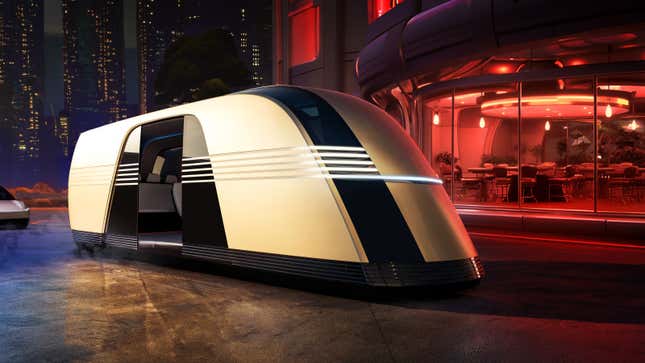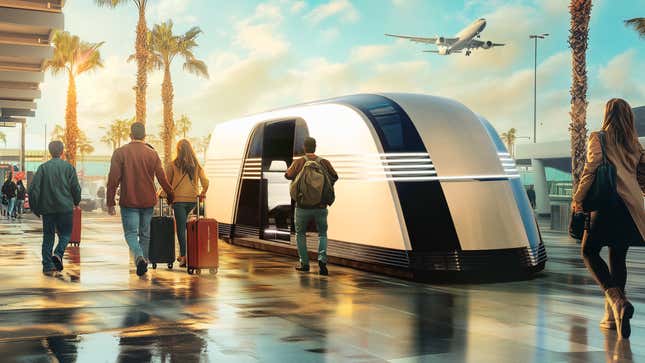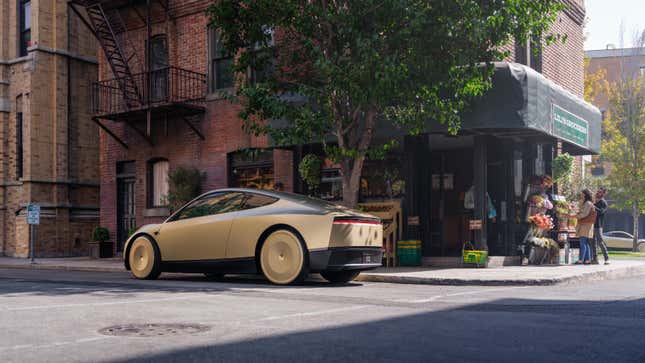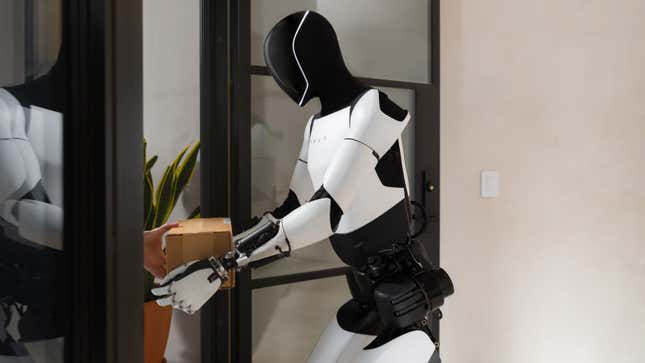Here’s Everything Elon Musk Announced At Tesla’s Cybercab Launch Event

After years of promises and months of delays, Tesla boss Elon Musk finally took to the stage last night to unveil the company’s first autonomous taxi. Dubbed the Cybercab, the two-seat vehicle will put a new version of the company’s Full Self-Driving tech to good use, could become the company’s cheapest model and will reportedly be ready to roll in 2026.
Tesla Had A Very Interesting Week
That’s a lot of big promises from a man who has a history of missing deadlines, breaking promises and delaying product launches. But, that wasn’t the only thing Musk announced during the We, Robot event and the Cybercab will one day be joined by an autonomous van, more self-driving capabilities for current Tesla models and a humanoid robot that can help you out around the house.
In order to make sure you didn’t miss anything from the event in LA last night, we’ve rounded up all the biggest announcements in one handy place.
Tesla Cybercab
Image: Tesla
The event kicked off with the Cybercab, a two-seat autonomous vehicle that is meant to pave the way for Tesla’s autonomous future. The car has been a long time coming, with Musk first announcing plans for a fleet of autonomous Tesla taxis way back in 2014. Ten years later, the creation has finally broken cover and, I won’t lie, I do dig the design of the little guy. It’s got familiar Tesla lines, a sharp rear quarter and there’s a slick light bar running along the front. But looks are far from the interesting story here, it’s what’s inside that counts.
Inside, the Cybercab will be packed with all manner of self–driving tech, reports the Guardian. The system will use the company’s Full Self-Driving suite, which means it will rely on cameras and artificial intelligence to map the road ahead and plot a route through town, as the Guardian reports:
The Cybercab will have no steering wheel or pedals, Musk said, and will have inductive charging rather than a plug.
He added that Tesla had “overspecced” the computer in the vehicles in what he termed as an Amazon Web Services style of computing – where it can be distributed across the network of cars.
The Cybercab will be hailed through an app, similar to Uber, and Musk claimed that once you call a Cybercab it will be on hand for your needs through the day for everything from quick trips to the shops to longer journeys.
Once you’re done with your day in the Cybercab, it will also reportedly be kitted out with self-cleaning kits that can wipe down seats and vacuum carpets, adds Tesla news site Not A Tesla App.
That all sounds mighty impressive, but it’s one thing to promise kit like this and it’s another to actually deliver it. With that in mind, Musk initially said the Cybercab would be in production in 2026, before adding that he can be a “little optimistic with timeframes” and added that it would be available “before 2027.”
Whenever it finally hits the market, the Cybercab will become Tesla’s cheapest offering, with the company targeting retail prices around $30,000.
Tesla Robovan

Image: Tesla
The Cybercab wasn’t the only autonomous vehicle that’s in the works at Tesla. The company also has a much larger self-driving machine stashed up its sleeve: The Robovan, a boxy interpretation of mass transit.
The Robovan, which apparently is pronounced “ruh-boh-vehn,” looks like a futuristic train with its triangular front end and pleasing blend of sharp angles and smooth curves. Inside, it reportedly has space for up to 20 passengers and, like the Cybercab, comes with no steering wheels, pedals or controls of any kind, reports the Verge.
When it hits the highway, the Robovan will be Tesla’s solution for “high density” travel, Musk said during its unveiling in LA. The autonomous van will work on the same Tesla app that the company is planning for the Cybercab but will offer greater capacity:
The Robovan is intended for the company’s Tesla Network, an autonomous ridehailing service for purpose-built self-driving cars, as well as Tesla customers’ personally owned vehicles.
Tesla has dropped hints about a van before. In its Master Plan Part Deux, the company said it was developing “high passenger-density urban transport” and also suggested that autonomous buses could be deployed. And earlier this year, Musk showed an image of a cloaked van-shaped vehicle as part of the company’s annual shareholder meeting.
Given Musk’s notorious disdain for public transportation, it seemed unlikely that he would commit resources to anything like a van. But in Master Plan Part 3, the company lists “bus” and “commercial/passenger vans” as “TBD.”
Actual details on the performance of the van were very thin on the ground, with no word on its range, power or performance shared by Musk. On top of that, a release date and price for the Robovan were also not to be seen during the We, Robot event.
Unsupervised Full Self-Driving

Image: Tesla
The self-driving fun isn’t reserved for shiny new cars, though, and Tesla revealed that autonomy was coming to its normal cars next year. Sure, this might be the 11th year that Musk has promised full self-driving is coming next year, but maybe he means it this time? Who knows.
Anyway, if you believe it is coming next year, then you’ll be pleased to hear that Unsupervised Full Self-Driving will be available for Tesla Model 3 and Model Y cars from 2025, reports the Guardian. The tech will initially be available for owners in California and Texas, before rolling out across America, as the Guardian explains:
“With autonomy, you get your time back. It’ll save lives, a lot of lives, and prevent injuries,” he said.
He said the cars would be safer than humans driving given Tesla has gathered driving data from millions of vehicles.
“With that amount of training data it’s obviously going to be much better than a human can be because you can’t live a million lives,” he said. “It doesn’t get tired, and it doesn’t text. It’ll be 10, 20, 30 times safer than a human.”
The tech won’t be limited to Model 3 and Y owners, however, and the Guardian added that Unsupervised Full Self-Driving would come to Model S and X owners. In true Musk fashion, however, the Tesla boss failed to reveal a timeframe for when that could happen.
Master Plan Part 4

Image: Tesla
The rollout of the Cybercab, Robovan and updated FSD tech will all form part of Tesla’s Master Plan Part 4, which was teased over the course of the We, Robot event last night. Sure, the paperwork wasn’t handed out, but Musk and the other presenters on the night gave us a good idea of what to expect from the plan when it’s finally revealed.
The plan appears to be all about making more time for people. Self-driving cars will give people more free time by taking away the need to drive, and an autonomous future will free up car parks to become people parks to help make cities much greener, reports Not A Tesla App.
As part of its mission to make cities better, Tesla also wants to make transport infrastructure better, apparently. To do this, it will tackle it’s three biggest shortcomings, the site adds, including that transport today is “too expensive, not safe, and not sustainable,” adds Not A Tesla App. How Tesla will do that is still very much up in the air.
Tesla Optimus

Image: Tesla
Finally, Tesla gave an update on its humanoid Optimus robot, which apparently will one day take on all the shitty jobs you don’t want to do. During the event, the robot showed off its skills by performing a dance and mixing drinks, so I imagine the world’s bartenders and dancers are now quaking in their boots.
During We, Robot, a fleet of around 30 Optimus robots was on display, showing off their ability to walk around and carry out a few basic tasks. The ’bots have clearly come a long way since they were first unveiled in 2021 as a man in a suit, and that means that Tesla is almost ready to start selling them.
As such, the automaker revealed that they could cost around $30,000 when they do go on sale. When that happens, they’ll be capable of doing “daily human tasks like bringing in a package from the porch and watering your plants,” reports the Verge:
“The Optimus will walk amongst you,” Tesla CEO Elon Musk says. “You’ll be able to walk right up to them, and they will serve drinks.”
Musk explains it can basically “do anything” and mentions examples like walking your dog, babysitting your kids, and mowing your lawn. He said it will cost $20,000 to $30,000 “long term.”
“I think this will be the biggest product ever of any kind,” Musk says.
Again, there was no timeframe on when we can expect these robots to actually hit the market, so watch this space for more disappointment and delays from Musk.


